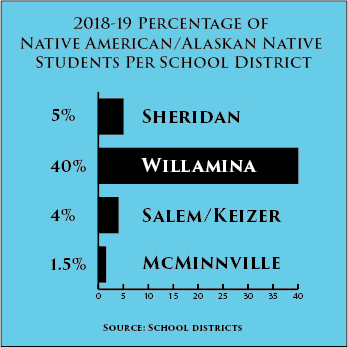Health & Education
Local school districts prepare to start teaching Native curriculum in January

By Danielle Frost
Smoke Signals staff writer
After an almost three-year process, school districts across the state are preparing to implement curriculum based on the Native American experience of Oregon history.
In 2017, the Oregon Legislature passed Senate Bill 13, now known as Tribal History/Shared History. It required the Oregon Department of Education to develop curriculum relating to the Tribal experience in Oregon, and to provide training to educators in the areas of Tribal history, sovereignty, culture, treaty rights, government, socioeconomic experiences and current events.
Tribal Curriculum Specialist Mercedes Jones and her staff have been working with nearby districts before and after the passage of Senate Bill 13.
In 2014, the Tribe developed fourth-grade curriculum using grant funds from the Administration for Native Americans. Eighth-grade curriculum was completed in 2016.
“We partnered with Willamina elementary and middle school to gather teacher input on lesson plans,” Jones says. “Teachers then piloted the lesson plans for us and gave feedback. I actually was in my last term of grad school and was doing my student teaching placement in a fourth-grade class at Willamina Elementary and piloted some of the lessons. It was neat to be able to be part of that process.”
Willamina School District Superintendent Carrie Zimbrick agrees.
“We are very pleased that Senate Bill 13 passed and providing
Tribal history, particularly our local history, is now required,” Zimbrick says.
Tribal History/Shared History curriculum was developed by a committee and will be implemented in school districts across the state for required teaching starting in January to students in the fourth, eighth and 10th grades. The state Education Department has created 45 lessons.
The committee included 18 representatives from Oregon’s nine federally recognized Tribes, led by Portland-based Education Northwest Consultants, a nonprofit organization that worked with the Department of Education to support implementation of Senate Bill 13.
The groundwork for the law began when the Department of Education adopted the Native American/Alaska Native Education State Plan, which required teaching about Native Americans as a part of social studies state standards. The Tribal History/Shared History curriculum will expand those requirements across multiple subject areas that include English, math, science, social studies and physical education/health classes.
Currently, the department has 45 lessons available to districts for fourth-, eighth- and 10th-grade students. Districts will choose one lesson per grade in each content area and teach a minimum of 15 lessons. Eventually, the department plans to create lessons for all students from preschool to high school.
The Sheridan School District has worked over the past two years to build stronger relationships with the Tribe, says Superintendent Steven Sugg.
Teachers and administrators meet several times a year to discuss student progress and how to best support each student.
“As superintendent, I have attended conferences and meetings where Senate Bill 13 was a topic of discussion and I have reviewed the material on the Oregon Department of Education website,” Sugg says. “Our middle school social studies teacher Tim Hart has taught lessons around Tribal history for years and his students create models of Native American villages each year. He works closely with the Tribe and the models are often displayed in Grand Ronde.”
The district is also planning to have training around Senate Bill 13 as part of its in-service this year.
“We look forward to incorporating the lesson plans into our school curriculum,” Sugg says. “This curriculum will help these students with a sense of belonging and a sense of their history being honored.”
The Tribe also has partnered with Salem-Keizer School District teachers and a math teacher from Chemawa Indian School.
“Because Senate Bill 13 is a statewide initiative, we wanted to get as much teacher buy-in that we could, which was helpful if we partnered with a larger school district,” Jones said.
Recently, the Tribe also hosted Willamina staff at Chachalu Museum & Cultural Center for a professional development training on Senate Bill 13 after the district reached out to the Tribe. There are four more sessions planned to dive deeper into lesson content and material.
“Looking to improve our practice and embed more local history is always welcome and encouraged,” Zimbrick says.
A spokesperson for the McMinnville School District said it had upcoming trainings planned to prepare educators to implement Senate Bill 13, and that administrators, including Superintendent Maryalice Russell, had met with Department of Education staff to discuss curriculum.
